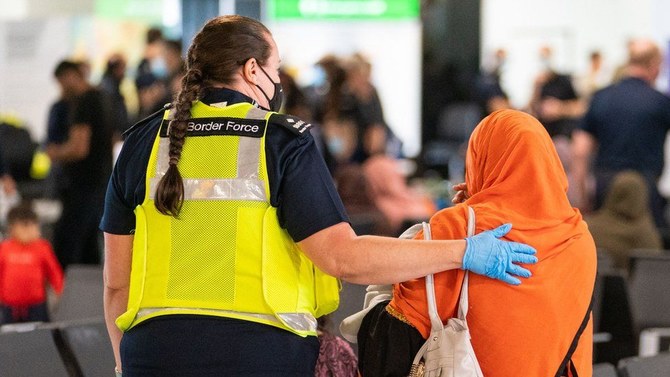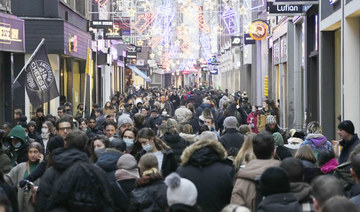LONDON: There are “serious fears” about the potential risk the omicron variant of COVID-19 poses to the health of thousands of Afghan asylum seekers housed by UK authorities in temporary hotel accommodation, experts told Arab News.
The UK is facing one of the world’s worst omicron outbreaks. On Sunday, the country recorded more than 80,000 new COVID-19 infections. Many of the new cases are believed to be caused by the omicron variant, which experts believe is much more infectious than the previously dominant delta variant.
While the spread of omicron is bad news for everyone in Britain, for the estimated 7,000 Afghan asylum seekers living in government-provided hotel accommodation it presents a particularly acute threat.
Jenny Phillimore, a professor of migration and superdiversity at the UK’s University of Birmingham, told Arab News: “We’ve had outbreaks of COVID in the hotels asylum seekers were housed in during the earlier waves (of the pandemic), and of course omicron is said to be much more infectious.”
She added that unconfirmed reports are already emerging from other countries of omicron infections spreading between people in separate rooms in hotels used for quarantine, even though they have not come into direct contact, which is a bad sign for the thousands of Afghans waiting for permanent accommodation in the UK.
About 12,000 people were evacuated from Kabul by UK authorities in August during the final days of the NATO mission in Afghanistan. Many of them had worked alongside British troops in a variety of support roles, and British Prime Minister Boris Johnson promised them a “warm welcome.” More than three months after the evacuations, however, it is thought that thousands are still waiting for long-term housing.
Britain’s Home Office refused to confirm to Arab News exactly how many Afghans remain in hotel accommodation, but said it takes their welfare “very seriously.”
Phillimore has conducted extensive research into access to healthcare among asylum seekers living in temporary accommodation. She warned that if an outbreak occurs among the many families currently residing in temporary hotel accommodation, it is “highly unlikely” that they will be able to protect others from also becoming infected.
“At earlier stages (of the pandemic), it was impossible to social distance (in hotels),” Phillimore said. She was told while conducting her research that during previous waves of infection “there were no additional hygiene measures” and asylum seekers “were not provided with masks.”
Now, she said, “it’s really overcrowded. We’ve got serious fears over what will happen to people trapped in a hotel, in a pandemic, in one room with their family.”
She added: “From now on, whatever we do, we have to plan everything we do as if there’s a pandemic on. We need to have contingency plans in place; we can’t just leave these people sitting in hotels because there’s a pandemic on.”
This planning must include access to proper healthcare services, too, Phillimore said. Her own research and studies by the Refugee Council have exposed the difficulties asylum seekers face in accessing the UK’s sprawling healthcare system.
While living in hotels, she said, “it’s difficult to access certain kinds of care, unless you can go via a GP (general practitioner).”
The need for mental health services — which are particularly important for people fleeing decades of war — is even more desperate.
“It’s a nightmare. Access to mental healthcare for the entire population is an absolute disaster,” said Phillimore. She added that everyone in the UK has to “jump through hoops” to access mental health support in Britain, “but this is much, much harder from temporary accommodation.”
Judith Dennis, policy manager at the Refugee Council, told Arab News: “We remain deeply concerned by just how many Afghan refugees are still stuck in hotel accommodation, waiting for clarity about what is to happen to them and where they may end up living.
“Though we appreciate the government had to work at speed to support those who evacuated Kabul, hotel accommodation is simply not good enough for people to be living in longer term.”
She added that the wait for resettlement “only adds intense mental distress to many men, women and children who have already been through unimaginable trauma and are desperate to rebuild their lives here. As long as people are marooned in hotels, we worry they are unable to access the vital support and health services they need to recover.”
A spokesperson for the Home Office told Arab News: “We take the welfare of those in our care very seriously; we ensure that all accommodation follows safety standards and COVID-19 regulations, and all Afghan arrivals have been offered the COVID-19 vaccine.
“We expect high standards from all our accommodation providers and anyone who has any concerns can speak with Home Office liaison officers on the ground.”














